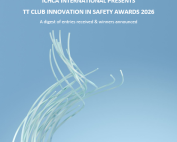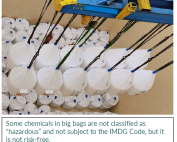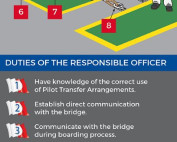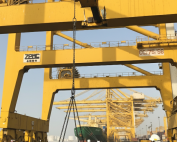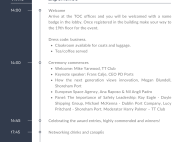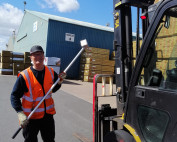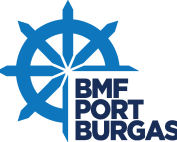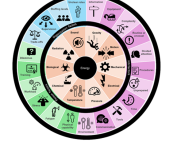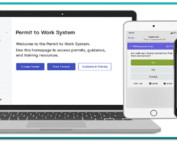Corporate Licensed Members
ICHCA’s corporate licensed members represent key interest groups and expertise clusters, all concerned with fostering knowledge and best practice within their own communities and across the broader cargo handling and transport chain.
Announcing the TT Club Innovation in Safety Awards 2026 Digest
The TT Club Innovation in Safety Awards 2026 has celebrated some of the most forward-thinking ideas driving safety improvements across the maritime and cargo handling industries, and now, the full digest of winners and entries is available to view online. From high-impact digital tools to practical safety solutions developed by innovators around the world, this year’s Awards showcased a remarkable range of initiatives that are helping shape safer workplaces, smarter operations and more resilient supply chains. The digest captures each entrant in their own words, providing readers with insight into the inspiration, application and potential industry impact of every submission. Whether you’re interested in cutting-edge technology, human-centric safety practices, or transformative process innovations, the 2026 Awards digest is a source of meaningful ideas and practical takeaways for safety professionals, operations leaders, regulators and anyone committed to continuous improvement in cargo and maritime safety. What You’ll Find in the Digest Profiles of all Award entrants from international organisations to individual innovators Detailed summaries of winners and standout entries Insight into emerging safety trends and industry priorities Examples of real-world solutions designed to save lives and reduce risk Explore the full TT Club Innovation in Safety Awards 2026 digest and be [...]
Winning innovators in cargo handling safety celebrated by TT Club and the ICHCA
Left to right - Chris Hoyle (UK Maritime Pilots’ Association), Jonathan Smith (UK Maritime Pilots’ Association), John Slater (UK Maritime Pilots’ Association), Dermot Kerrigan (Active Training Team), Mark Tumlinson (Long Beach Container Terminal), Richard Steele (ICHCA), Mike Yarwood (TT Club), Sean Deane (TOC), Lucy Pritchard (Shoreham Port), Megan Blundell (Shoreham Port), Joerg Spiegelhalter (SICK AG), Frans Calje (PD Ports) Image is Copyright John Knight Photography johnknightphotography.co.uk Four cutting-edge safety solutions have been honoured for their potential to transform industry practices and save lives The winners of this year's TT Club Innovation in Safety Awards were announced at a presentation ceremony in London today, recognising four outstanding innovations that demonstrate the cargo handling industry's continued commitment to protecting workers and improving operational safety. Independently organised by international cargo handling association ICHCA, the TT Innovation in Safety Awards are dedicated to both organisations' mission to promote and improve safety in all operational aspects of the supply chain. In encouraging innovation, the awards are aimed at showcasing products, processes and services that address safety issues to as wide an audience as possible in an increasingly complex and challenging industry. This year's winners, selected from an impressive field of entries across four distinct [...]
Member Benefit: Complimentary Delegate Places at Philippine Ports and Logistics 2026, 10 – 12 March, Manila, The Philippines
We would like to announce the latest member benefit in partnership with Transport Events: Philippine Ports and Logistics 2026. We have secured an exclusive opportunity for five complimentary ICHCA Member delegate places, each valued at €1,995, for this prestigious event. If you would like to attend, please email secretariat@ichca.com to secure your spot. We need your confirmation as soon as possible, subject to availability, so don’t miss out! Transport Events invites you to Philippine Ports and Logistics 2026, the region’s leading event for ports and logistics, taking place at Solaire Resort, Manila, The Philippines, from Tuesday, 10 March to Thursday 12 March 2026 officially endorsed by the Department of Transportation, The Philippines. The Philippines is a vital maritime hub strategically located along key global trade routes in the Asia-Pacific region. Positioned near the South China Sea, one of the world’s busiest maritime corridors, the Philippines is central to global shipping, trade, and supply chain networks, making it a key player in international commerce. An exclusive tour of Manila’s world-class port and logistics facilities is scheduled on first day. Registered delegates will gain firsthand insights into the advanced infrastructure and operations driving efficiency and growth in the region’s maritime sector. [...]
ICHCA Member G2 Ocean, latest Safety Bulletin – Toxic gases (also available in Portuguese & Spanish)
This edition is about two potential sources of toxic gases on board: Fumigation, and chemical reactions involving cargo. CLICK HERE FOR THE FULL SAFETY BULLETIN IN ENGLISH CLICK HERE FOR THE FULL SAFETY BULLETIN IN PORTUGESE CLICK HERE FOR THE FULL SAFETY BULLETIN IN SPANISH Message from G2 Ocean: "We in G2 Ocean work with stevedores all over the world. By sharing lessons learned on safety between companies and ports, we believe we can reduce the number of incidents and personal injuries in our industry. It is part of G2 Ocean’s desired safety culture to always seek and share insights on safety. We thank all stevedore companies who have signed up for our monthly Safety Bulletin! All our vessels receive a copy. The crew work closely together with the stevedores in port, and the topics are relevant also for them. The bulletin is also sent to the G2 Ocean Port Captains. They are exposed to the same hazards as stevedores and can make a difference where it really matters; at the “sharp end” during cargo operations. Each bulletin is a 2-pager focusing on a specific safety topic. There are no obligations on the receiver, but we encourage you to [...]
Meet the TT Club Innovation in Safety Award Entrants: WARRENPOINT HARBOUR AUTHORITY
Cameras on a mobile harbour crane provide live safety coverage of activities on the vessel during discharge as well as of the cargo set-down area on the quayside. FOR THE FULL DETAILS CLICK HERE In the countdown to this year's Innovation in Safety Award Ceremony we are sharing each of the entries that we received in their own words. The wide range of entries means that there are ideas that will appeal to different readers directly or may be the inspiration for your own next step change for safety. We will introduce you all to all of the entries before the Award Ceremony on 25 February 2026. Register now for free entry to the ceremony by e-mailing secretariat@ichca.com. We look forward to welcoming you on the day!
Meet the TT Club Innovation in Safety Award Entrants: UNITED KINGDOM MARITIME PILOTS ASSOCIATION
Interactive digital poster to translate technical Pilot Transfer Arrangements regulations into a clear, visual format with step-by-step illustrations of compliant and non-compliant arrangements. FOR THE FULL DETAILS CLICK HERE In the countdown to this year's Innovation in Safety Award Ceremony we are sharing each of the entries that we received in their own words. The wide range of entries means that there are ideas that will appeal to different readers directly or may be the inspiration for your own next step change for safety. We will introduce you all to all of the entries before the Award Ceremony on 25 February 2026. Register now for free entry to the ceremony by e-mailing secretariat@ichca.com. We look forward to welcoming you on the day!
Meet the TT Club Innovation in Safety Award Entrants: TURTLE FIRE SYSTEMS, LLC
System that provides continuous, targeted cooling directly to the source of a fire, whether beneath an electric vehicle, battery rack, or deck surface. FOR THE FULL DETAILS CLICK HERE In the countdown to this year's Innovation in Safety Award Ceremony we are sharing each of the entries that we received in their own words. The wide range of entries means that there are ideas that will appeal to different readers directly or may be the inspiration for your own next step change for safety. We will introduce you all to all of the entries before the Award Ceremony on 25 February 2026. Register now for free entry to the ceremony by e-mailing secretariat@ichca.com. We look forward to welcoming you on the day!
Meet the TT Club Innovation in Safety Award Entrants: TrafficAngel – DRIVERPROTECT
Low-cost, simple-to-fit, multi-functional AI human detection camera system designed specifically to protect drivers in their cabs. FOR THE FULL DETAILS CLICK HERE In the countdown to this year's Innovation in Safety Award Ceremony we are sharing each of the entries that we received in their own words. The wide range of entries means that there are ideas that will appeal to different readers directly or may be the inspiration for your own next step change for safety. We will introduce you all to all of the entries before the Award Ceremony on 25 February 2026. Register now for free entry to the ceremony by e-mailing secretariat@ichca.com. We look forward to welcoming you on the day!
Meet the TT Club Innovation in Safety Award Entrants: SICK AG – MULTISCAN100-S
First safety-certified 3D LiDAR sensor for safe collision avoidance in automated container terminal operations. FOR THE FULL DETAILS CLICK HERE In the countdown to this year's Innovation in Safety Award Ceremony we are sharing each of the entries that we received in their own words. The wide range of entries means that there are ideas that will appeal to different readers directly or may be the inspiration for your own next step change for safety. We will introduce you all to all of the entries before the Award Ceremony on 25 February 2026. Register now for free entry to the ceremony by e-mailing secretariat@ichca.com. We look forward to welcoming you on the day!
Meet the TT Club Innovation in Safety Award Entrants: SIBRE – SNAG LOAD PROTECTION AND GUARDIAN
Combines Snag Load Protection and its add-on Guardian, to deliver the world’s first preventive protection system against snag-load events. FOR THE FULL DETAILS CLICK HERE In the countdown to this year's Innovation in Safety Award Ceremony we are sharing each of the entries that we received in their own words. The wide range of entries means that there are ideas that will appeal to different readers directly or may be the inspiration for your own next step change for safety. We will introduce you all to all of the entries before the Award Ceremony on 25 February 2026. Register now for free entry to the ceremony by e-mailing secretariat@ichca.com. We look forward to welcoming you on the day!
TT Club Innovation in Safety Award Ceremony on Wednesday 25 February 2026 at 14:00 GMT
To reserve your place please email secretariat@ichca.com
Meet the TT Club Innovation in Safety Award Entrants: SHOREHAM PORT AUTHORITY
‘Dunnage placement tool’ that holds dunnage at exactly the right angle at the end of a lightweight pole, enabling dunnage to be positioned exactly where needed with precision and ease. FOR THE FULL DETAILS CLICK HERE In the countdown to this year's Innovation in Safety Award Ceremony we are sharing each of the entries that we received in their own words. The wide range of entries means that there are ideas that will appeal to different readers directly or may be the inspiration for your own next step change for safety. We will introduce you all to all of the entries before the Award Ceremony on 25 February 2026. Register now for free entry to the ceremony by e-mailing secretariat@ichca.com. We look forward to welcoming you on the day!
Meet the TT Club Innovation in Safety Award Entrants: ROMBIT EUROPE
Wearable technology combining gas sensors with an existing safety platform - unifying safety data, simplifying hardware management, ensuring faster response to calamities. FOR THE FULL DETAILS CLICK HERE In the countdown to this year's Innovation in Safety Award Ceremony we are sharing each of the entries that we received in their own words. The wide range of entries means that there are ideas that will appeal to different readers directly or may be the inspiration for your own next step change for safety. We will introduce you all to all of the entries before the Award Ceremony on 25 February 2026. Register now for free entry to the ceremony by e-mailing secretariat@ichca.com. We look forward to welcoming you on the day!
BMF Port Burgas Becomes a Member of ICHCA
The Bulgarian port operator BMF Port Burgas, which carries out extensive cargo handling at the Black Sea Port of Burgas has joined the international association of cargo handling interests. The company which operates modern port terminals with focus on containerized, bulk, liquid and general cargo, believes membership of ICHCA will enhance its pursuit of safety excellence. The two organisations joint aims of safeguarding workers in the sector while maintaining productivity, will be well served by the unity. So, the latest addition to the association is welcomed by ICHCA. The new member values the strengths of the Association, which emanate from more than seventy years of experience in the field. The membership, and the technical panel in particular comprises a range of top-level global experts dedicated to honing the best working practices of the cargo handling industry and delivering them to operators throughout the world. Chief Legal Advisor for BMF, Ms Vesela Dzhundzhurova was clear on the reasoning behind the decision, “BMF Port Burgas believes in the relentless pursuit of world-class safety excellence,” she states. “As a company in the ever-changing field of port operations, we invest constantly to provide reliable and safe services for our clients. ICHCA is an [...]
Meet the TT Club Innovation in Safety Award Entrants: PSYCHOLOGY APPLIED LIMITED & ENERGY INSTITUTE
A free, practical guide developed by experienced practitioners to help organisations embed human factors into everyday task-based risk assessment. FOR THE FULL DETAILS CLICK HERE In the countdown to this year's Innovation in Safety Award Ceremony we are sharing each of the entries that we received in their own words. The wide range of entries means that there are ideas that will appeal to different readers directly or may be the inspiration for your own next step change for safety. We will introduce you all to all of the entries before the Award Ceremony on 25 February 2026. Register now for free entry to the ceremony by e-mailing secretariat@ichca.com. We look forward to welcoming you on the day!
Meet the TT Club Innovation in Safety Award Entrants: PEEL PORTS GROUP
Fully digitalised bespoke in house designed permit system to manage authorisation to work, permit to work and marine consents. FOR THE FULL DETAILS CLICK HERE In the countdown to this year's Innovation in Safety Award Ceremony we are sharing each of the entries that we received in their own words. The wide range of entries means that there are ideas that will appeal to different readers directly or may be the inspiration for your own next step change for safety. We will introduce you all to all of the entries before the Award Ceremony on 25 February 2026. Register now for free entry to the ceremony by e-mailing secretariat@ichca.com. We look forward to welcoming you on the day!
Meet the TT Club Innovation in Safety Award Entrants: PASSIFY GMBH
Hardware-free, app-based truck handling system that combines secure driver authentication with streamlined gate and yard processes. FOR THE FULL DETAILS CLICK HERE In the countdown to this year's Innovation in Safety Award Ceremony we are sharing each of the entries that we received in their own words. The wide range of entries means that there are ideas that will appeal to different readers directly or may be the inspiration for your own next step change for safety. We will introduce you all to all of the entries before the Award Ceremony on 25 February 2026. Register now for free entry to the ceremony by e-mailing secretariat@ichca.com. We look forward to welcoming you on the day!
Meet the TT Club Innovation in Safety Award Entrants: NATIONAL CARGO BUREAU – GLOBAL RESTRICTED CARGO DATABASE
A centralized restricted cargo database designed to consolidate and standardize restrictions across the maritime supply chain. FOR THE FULL DETAILS CLICK HERE In the countdown to this year's Innovation in Safety Award Ceremony we are sharing each of the entries that we received in their own words. The wide range of entries means that there are ideas that will appeal to different readers directly or may be the inspiration for your own next step change for safety. We will introduce you all to all of the entries before the Award Ceremony on 25 February 2026. Register now for free entry to the ceremony by e-mailing secretariat@ichca.com. We look forward to welcoming you on the day!
Meet the TT Club Innovation in Safety Award Entrants: MODALINTA
New net system and deployment method for accommodation ladders that engineers out risk in both positioning and use. FOR THE FULL DETAILS CLICK HERE In the countdown to this year's Innovation in Safety Award Ceremony we are sharing each of the entries that we received in their own words. The wide range of entries means that there are ideas that will appeal to different readers directly or may be the inspiration for your own next step change for safety. We will introduce you all to all of the entries before the Award Ceremony on 25 February 2026. Register now for free entry to the ceremony by e-mailing secretariat@ichca.com. We look forward to welcoming you on the day!
Meet the TT Club Innovation in Safety Award Entrants: LYTTELTON PORT COMPANY (LPC), CHRISTCHURCH, NEW ZEALAND
Eliminated the need for working at height and exposure to person vs plant risk through the use of high-resolution camera drone inspections. FOR THE FULL DETAILS CLICK HERE In the countdown to this year's Innovation in Safety Award Ceremony we are sharing each of the entries that we received in their own words. The wide range of entries means that there are ideas that will appeal to different readers directly or may be the inspiration for your own next step change for safety. We will introduce you all to all of the entries before the Award Ceremony on 25 February 2026. Register now for free entry to the ceremony by e-mailing secretariat@ichca.com. We look forward to welcoming you on the day!

